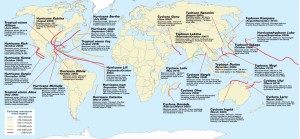People Get Ready: ‘Unprecedented’ Weather Glimpses Century Ahead
ENVIRONMENT, 8 Jul 2013
Latest Report from the World Meteorological Organization Says First Decade of Century Was Hottest, Wettest On Record with More to Come

It was a decade of ‘unprecedented’ extreme weather, caused by warmer oceans, hotter temperatures, and an atmosphere saturated with moisture. And there’s more where that came from.
The rate of rising oceans has doubled, the heat temperatures for both land and water are on the rise, the melting of the Arctic ice is speeding up, and both the weather extremes the world is experiencing and the overall global warming trends are simply ‘unprecedented.’
That’s the assessment contained in the World Meteorological Organization’s latest report, The Global Climate 2001-2010, A Decade of Climate Extremes, which examined the first decade of the 21st century. The report, released Wednesday, arrived with this warning: we better get ready for more.
“Carbon-dioxide concentration […] reached an average global value of 389 parts per million by the end of the decade, the highest value recorded for at least the past 10,000 years.”
“Rising concentrations of heat-trapping greenhouse gases are changing our climate, with far reaching implications for our environment and our oceans, which are absorbing both carbon dioxide and heat,” said WMO Secretary-General Michel Jarraud.
The decade between 2001 and 2010, according to the report, was both the hottest and the wettest since modern records were started in 1850.
According to the report, “Carbon-dioxide concentration […] reached an average global value of 389 parts per million by the end of the decade, the highest value recorded for at least the past 10,000 years.”
The group, which takes a global look at weather events and their relationship to macro trends in atmospheric and ocean patterns, says looking at a complete decade of data is the best way to make accurate analysis of a climate system as complex as the Earth’s.
“A decade is the minimum possible timeframe for meaningful assessments of climate change,” said Jarraud. “WMO’s report shows that global warming was significant from 1971 to 2010 and that the decadal rate of increase between 1991-2000 and 2001-2010 was unprecedented.”
On an annual basis, he continued, regional and global trends may go up and down, but on a “long-term basis the underlying trend is clearly in an upward direction.”
The WHO also released this video summary of their report:
httpv://www.youtube.com/watch?v=qSz7U0C0bsY
This work is licensed under a Creative Commons Attribution-Share Alike 3.0 License.
Go to Original – commondreams.org
DISCLAIMER: The statements, views and opinions expressed in pieces republished here are solely those of the authors and do not necessarily represent those of TMS. In accordance with title 17 U.S.C. section 107, this material is distributed without profit to those who have expressed a prior interest in receiving the included information for research and educational purposes. TMS has no affiliation whatsoever with the originator of this article nor is TMS endorsed or sponsored by the originator. “GO TO ORIGINAL” links are provided as a convenience to our readers and allow for verification of authenticity. However, as originating pages are often updated by their originating host sites, the versions posted may not match the versions our readers view when clicking the “GO TO ORIGINAL” links. This site contains copyrighted material the use of which has not always been specifically authorized by the copyright owner. We are making such material available in our efforts to advance understanding of environmental, political, human rights, economic, democracy, scientific, and social justice issues, etc. We believe this constitutes a ‘fair use’ of any such copyrighted material as provided for in section 107 of the US Copyright Law. In accordance with Title 17 U.S.C. Section 107, the material on this site is distributed without profit to those who have expressed a prior interest in receiving the included information for research and educational purposes. For more information go to: http://www.law.cornell.edu/uscode/17/107.shtml. If you wish to use copyrighted material from this site for purposes of your own that go beyond ‘fair use’, you must obtain permission from the copyright owner.